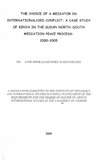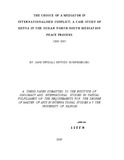| dc.contributor.author | Mutuku, Jane Mwikali | |
| dc.date.accessioned | 2013-05-09T13:11:17Z | |
| dc.date.available | 2013-05-09T13:11:17Z | |
| dc.date.issued | 2009 | |
| dc.identifier.uri | http://erepository.uonbi.ac.ke:8080/xmlui/handle/123456789/20902 | |
| dc.description | Master of Arts in International Studies | en |
| dc.description.abstract | Kenya continued to pursue duality of hosting the talks while supporting SPLM/A to the point of
facilitating the signing of the Comprehensive Peace Agreement (CPA). This anchors our interest
in this peace mediation process as the assumptions that the mediating parties to a conflict are
supposed to be neutral for a successful mediation to be brokered.
The study purposively selected 4 key informants. These were selected from the diplomatic
forum, Kenyan Government representative and South Sudan administrators. This was done
through purposive sampling procedure. They were key people who were involved in the
mediation process from Sudan and Kenya. A semi-structured interview schedule was used as a
guide during the interviews that were undertaken with the informants.
The results confirmed that the chief mediator does not need to be impartial to the warring parties
for a successful mediation to be achieved. It was noted that partiality is relative to the parties at
war. It was also revealed that the type of mediator determined if there would be success of the
mediation. This was in terms of the profession that the chief mediator held because it contributed
greatly to the mediation succeeding if they ~ in_the same profession with the warring parties.
Also exposed in the findings was that there was need tG..b.ave the mediators remaining in the
arena during the implementation of the peace agreement. It was noted failure to this, the
agreements risked falling and there was possibility of a return to conflict.
Understanding these dimensions of the choice of a suitable mediator have provided for a better
mechanism of handling intra-state conflicts in Africa. This, if applied, would see a greater
movement towards peace in Africa while dealing with the various intra-state conflicts that have
arisen and might arise in future. | en |
| dc.language.iso | en | en |
| dc.title | The choice of a mediator in Internationalised conflict; a case study of Kenya in the Sudan North-South mediation peace process:2000-2005 | en |
| dc.type | Thesis | en |
| local.publisher | Institute of Diplomacy and International Studies, University of Nairobi | en |


